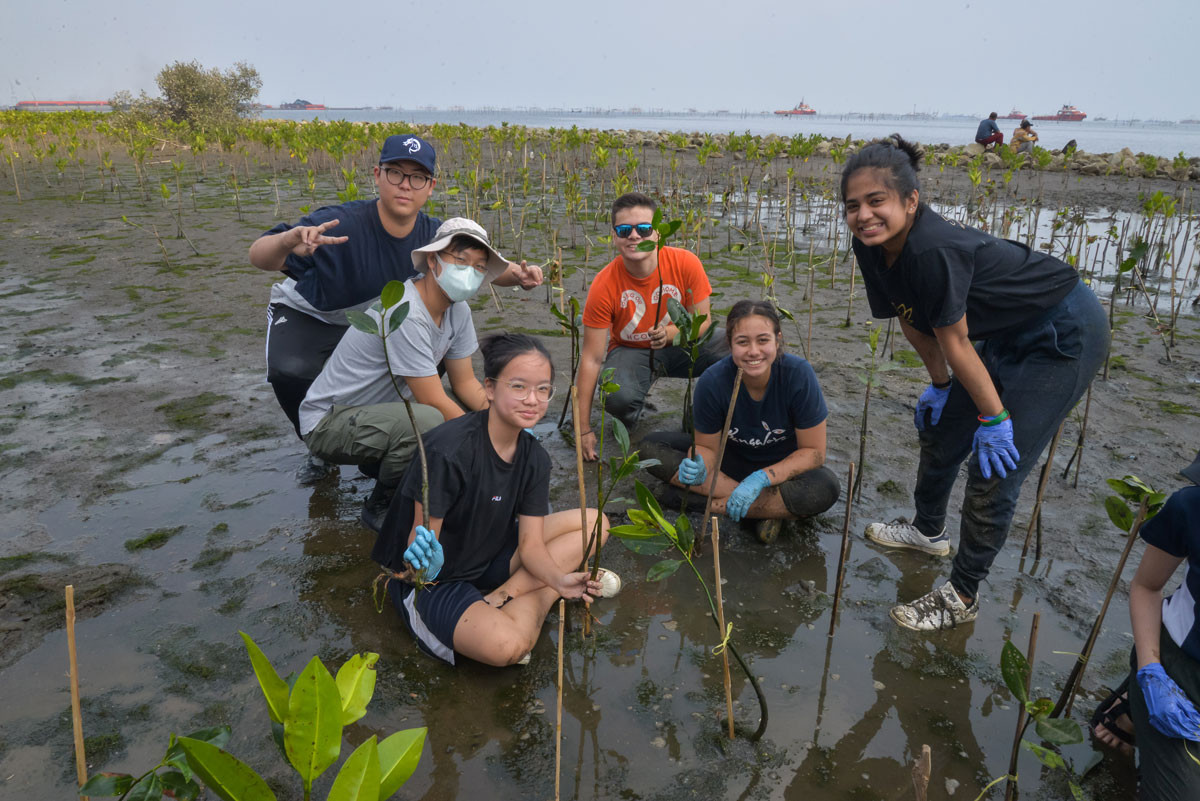Popular Reads
Top Results
Can't find what you're looking for?
View all search resultsPopular Reads
Top Results
Can't find what you're looking for?
View all search resultsAchieving sustainable development through education
Likewise, if we lose economic prosperity by placing too much emphasis on the environment, then it is not sustainable development either.
Change text size
Gift Premium Articles
to Anyone
“Japanese technologies are making our life convenient. However, don’t you think these technologies have an adverse impact on the environment?” I often receive questions like this from students in Indonesia. While the global agenda today seeks “sustainable development,” I feel that Indonesia’s younger generation sees “environmental friendliness” as the top priority.
With an eye to becoming one of the top-five economies by 2045, Indonesia is developing its infrastructure rapidly and its young people are witnessing these changes on a daily basis. It is also the era of Sustainable Development Goals (SDGs) when “development” must address global challenges, such as energy transition, climate change, air and water pollution, disaster risk reduction and biodiversity.
In Indonesia, where its rich and abundant nature has been affected by rapid economic growth, those challenges are readily visible in young people’s daily lives, and so the sense of urgency to tackle them might be stronger than in any other parts of the world.
Japan also experienced this same sense of urgency from the 1960s to 1980s when environmental problems occurred everywhere across the country. It is understandable that the younger generation in Indonesia does not want to follow the same path and believe that the greener the economy the better.
However, achieving sustainable development, which tends to be mistakenly understood as merely addressing environmental issues, is a far more complex process. The United Nations Resolution “Transforming our world: the 2030 Agenda for Sustainable Development” states that “We are committed to achieving sustainable development in its three dimensions – economic, social and environmental – in a balanced and integrated manner”.
Needless to say, if we sacrifice the environment for economic growth, then it is not sustainable development. Likewise, if we lose economic prosperity by placing too much emphasis on the environment, then it is not sustainable development either.
Sustainable development is not about stopping change. Rather, it is about coming up with realistic solutions in a rapidly changing world.
Japan has experience and knowledge in promoting this concept in the field of education, namely through the Education for Sustainable Development (ESD). The ESD aims to empower learners to make informed decisions and take responsible actions toward environmental integrity and economic viability not only for the present generation but also for future generations.
Japan proposed this concept in 2002 at the World Summit on Sustainable Development. In Japan, more than 1,000 schools are now members of the UNESCO Associated Schools network (ASPnet), which implements ESD through various school activities. Some schools chose disaster risk reduction while other schools chose cultural sustainability as their theme for learning sustainable development.
Each school discusses solutions for their local community on how to attain sustainability by balancing the economic, social and environmental dimensions. ESD activities are not only conducted inside schools but are interlinked with various stakeholders outside schools, such as the local authority, nongovernmental organizations and the private sector.
As the leading country for ESD, the government of Japan established the “UNESCO–Japan Prize for ESD” in 2014 to showcase good practices around the world. Among the 18 winners to date, two are from Indonesia: Jayagiri Center (Bandung) in 2015 and Kalabia Foundation (West Papua) in 2018. Indonesia is the only country from Southeast Asia that carries out prize-winning activities. Only the United Kingdom and Germany were awarded more than once besides Indonesia. Indonesia is clearly active in implementing ESD.
Besides the ASPnet schools, Indonesia also has its Adiwiyata schools, an initiative by the Environment and Forestry Ministry that awards schools engaged in environmental education. Adiwiyata schools now exceed 3,000 in number.
These schools do not only learn academically about environmental issues. Students also collaborate with the local community and learn how to effectively promote environmentally sustainable living. Some schools even generate revenue by collecting plastic bottles or producing compost using green waste from the wet markets.
Children recognize that sustainable development is something that they can make happen in their daily lives. They think creatively about what they can do by themselves to transform their society.
Growing interest in sustainable development in education also has a lot to do with education reforms both in Indonesia and Japan. In an era when rapid and long-lasting changes are happening at an unprecedented speed, children need to be able to think and express themselves and seek new and persuasive answers to their questions.
To achieve sustainable development, children need to address issues without being limited to single solutions, and to discuss in a collaborative manner with diverse stakeholders. In Japan, national curriculum standards were revised in 2020. In Indonesia, a new curriculum, the Kurikulum Merdeka (Freedom Curriculum), was launched this February.
Both reforms aim at equipping students with competencies such as creativity, critical thinking, problem solving and collaborative working. All of these skills are important for achieving sustainable development.
Japan has a treasure trove of lessons learned from our own experience of rapid development growth that we can share with Indonesia. At the same time, Indonesia is at the forefront of addressing global challenges amid its own economic development.
There are bound to be innovative ideas that we could share with the rest of the world if our two countries join hands. To give an example, one of the Adiwiyata schools in Jakarta created an art mural together with a Japanese ASPnet school. Both schools engaged in activities that promoted SDGs, and their students held online discussions about the theme of the mural.
The younger generation will shape our future. Let us share and learn from each other – Indonesia from Japan and Japan from Indonesia.
***
The writer is Japanese ambassador to Indonesia.











